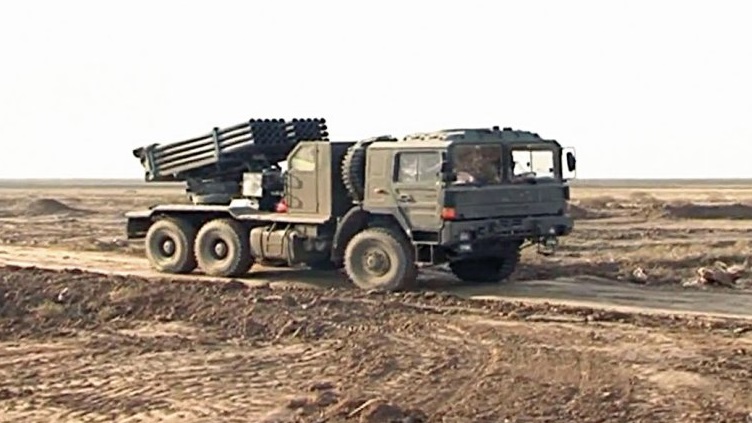Jeremy Binnie, London - IHS Jane's Defence Weekly
12 January 2015

12 January 2015

An Iranian-made HM-20 multiple rocket launcher seen in a video released by the Iraqi Ministry of Defence on
30 December. Source: Iraqi MoD
30 December. Source: Iraqi MoD
General Martin Dempsey, the chairman of the US Joint Chiefs of Staff, has provided the clearest indication to date that the United States does not view Iran's extensive military support for Iraq as problematic.
"Iran has been both interested and sought to influence the future of Iraq since Iraq's sovereignty was restored in 2004, so Iranian influence is not [a] surprise and Iranian advisors have been in Iraq for a very long time," Dempsey said in a joint press conference with his Israeli counterpart, Lieutenant General Benny Gantz, on 9 January. "As long as the Iraqi government remains committed to inclusivity of all the various groups inside the country, then I think Iranian influence will be positive."
"It's not threatening to US forces or to our mission at this point. If it were to become that way, then we would have to adapt our campaign plan," he added.
COMMENT
Iran's influence in Iraq has become increasingly apparent over the last six months as it has helped mobilise Shia militias to counter the Sunni militant group that calls itself Islamic State. Supported by Iran, these militias were responsible for inflicting the majority of British and many US military casualties during their 2003-12 deployment to Iraq.
The Shia militias are making widespread use of Iranian-made weapons and equipment and the appearance of their logos on Iraqi Army vehicles suggests they are merging with some regular units, raising questions about the military's inclusivity.
Iranian F-4 Phantom II aircraft have also been seen carrying out ground attack sorties in support of joint Iraqi Army-militia operations in the east of the country.
The Iraqi Army is also using military hardware that has come from Iran, most notably Su-25 ground attack aircraft. The Iraqi Ministry of Defence released a video on 30 December showing an HM-20 multiple rocket launcher (MRL) operating with the 5th Infantry Division in Salah-al-Din province. The HM-20 is the Iranian designation for a copy of the 122 mm BM-11 MRL mounted on a MAN LX tactical truck.
Any transfer of Iranian military equipment to Iraq, as well as the presence of Iranian military advisors, would be a violation of UN Security Council Resolution 1747, which banned any state from importing military items or services from the Islamic Republic.
The Iranian military assistance is being led by Brigadier General Qasem Soleimani, the commander of the Qods Force, which is the arm of the Islamic Revolution Guards Corps (IRGC) that supports foreign armed groups such as Lebanon's Hizbullah. Brig Gen Soleimani has been sanctioned three times by the US Treasury Department for his alleged role in nuclear weapons proliferation activity, a plot to assassinate the Saudi ambassador to the United States, and for supporting the Syrian government's violent repression of its people.
"Iran has been both interested and sought to influence the future of Iraq since Iraq's sovereignty was restored in 2004, so Iranian influence is not [a] surprise and Iranian advisors have been in Iraq for a very long time," Dempsey said in a joint press conference with his Israeli counterpart, Lieutenant General Benny Gantz, on 9 January. "As long as the Iraqi government remains committed to inclusivity of all the various groups inside the country, then I think Iranian influence will be positive."
"It's not threatening to US forces or to our mission at this point. If it were to become that way, then we would have to adapt our campaign plan," he added.
COMMENT
Iran's influence in Iraq has become increasingly apparent over the last six months as it has helped mobilise Shia militias to counter the Sunni militant group that calls itself Islamic State. Supported by Iran, these militias were responsible for inflicting the majority of British and many US military casualties during their 2003-12 deployment to Iraq.
The Shia militias are making widespread use of Iranian-made weapons and equipment and the appearance of their logos on Iraqi Army vehicles suggests they are merging with some regular units, raising questions about the military's inclusivity.
Iranian F-4 Phantom II aircraft have also been seen carrying out ground attack sorties in support of joint Iraqi Army-militia operations in the east of the country.
The Iraqi Army is also using military hardware that has come from Iran, most notably Su-25 ground attack aircraft. The Iraqi Ministry of Defence released a video on 30 December showing an HM-20 multiple rocket launcher (MRL) operating with the 5th Infantry Division in Salah-al-Din province. The HM-20 is the Iranian designation for a copy of the 122 mm BM-11 MRL mounted on a MAN LX tactical truck.
Any transfer of Iranian military equipment to Iraq, as well as the presence of Iranian military advisors, would be a violation of UN Security Council Resolution 1747, which banned any state from importing military items or services from the Islamic Republic.
The Iranian military assistance is being led by Brigadier General Qasem Soleimani, the commander of the Qods Force, which is the arm of the Islamic Revolution Guards Corps (IRGC) that supports foreign armed groups such as Lebanon's Hizbullah. Brig Gen Soleimani has been sanctioned three times by the US Treasury Department for his alleged role in nuclear weapons proliferation activity, a plot to assassinate the Saudi ambassador to the United States, and for supporting the Syrian government's violent repression of its people.


